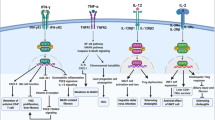Abstract
The HuH-7 human hepatoma cell line was stimulated by IL-1 and IL-6 to increase the synthesis of acutephase proteins, e.g. serum amyloid A (SAA),α1 antichymotrypsin (ACT), α1-protease inhibitor, α1 acid-glycoprotein and haptoglobin, with the exception of the pentraxins (serum amyloid P and C-reactive protein). Haptoglobin and ACT were stimulated by IL-1 which has not been observed in some other hepatoma cell lines. The concentration of IL-1 required for stimulation of SAA was higher than that required for haptoglobin stimulation. IL-1 receptor antagonist was capable of inhibiting these responses and acted at a lower concentration to inhibit SAA than required to inhibit ACT or haptoglobin induction. Transforming growth factor β (TGFβ) was also able to inhibit the response to IL-1 but had no effect on acute-phase protein responses to IL-6.
Similar content being viewed by others
References
P. C. Heinrich, J. V. Castell and T. Andus,Interleukin-6 and the acute phase response. Biochem. J.265, 621–636 (1989).
J. G. Raynes, S. Eagling and K. P. W. J. McAdam,Acute phase protein synthesis in human hepatoma cells: Differential regulation of SAA and haptoglobin by IL-1 and IL-6. Clin. Exp. Immunol.84, 488–492 (1991).
S. Bevan and J.G. Raynes,IL-1 receptor antagonist regulation of acute phase protein synthesis in human hepatoma cells. J. Immunol.147, 2547–2578 (1991).
C. M. Dubois, F. W. Ruscetti, E.W. Palaszinynski, L. A. Falk, J. J. Oppenheim and J. R. Keller,Transforming growth factor β is a potent inhibitor of IL-1 receptor expression; proposed mechanism of inhibition of IL-1 action. J. Exp. Med.172, 737–744 (1990).
M. Turner, D. Chantry, P. Katsikis, A. Berger, F. Brennan and M. Feldmann,Induction of the interleukin-1 receptor antagonist protein by transforming growth factor-β. Eur. J. Immunol.21, 1635–1639 (1991).
G. Morrone, R. Cortese and V. Sorrentino,Post-transcriptional control of negative acute phase genes by TGFβ. EMBO J.8, 3767–3771 (1989).
A. Makiewicz, M.K. Ganapathi, D. Schultz, A. Brabanec, J. Weinstein, M.F. Kelley and I. Kushner,TGFβ1 regulates production of acute phase proteins. Proc. Natl. Acad. Sci. USA87, 1491–1495 (1990).
Author information
Authors and Affiliations
Rights and permissions
About this article
Cite this article
Raynes, J.G., Bevan, S. Inhibition of the acute-phase response in a human hepatoma cell line. Agents and Actions 38 (Suppl 2), C66–C68 (1993). https://doi.org/10.1007/BF01991140
Issue Date:
DOI: https://doi.org/10.1007/BF01991140




